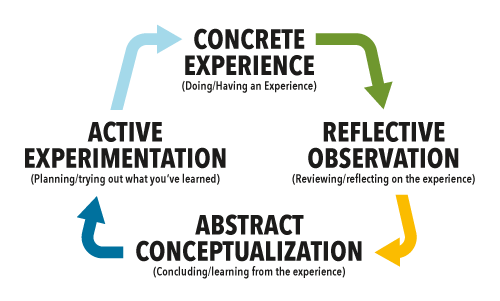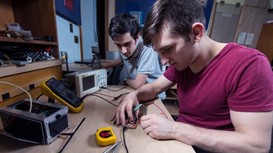Experiential Learning at NBCC
What is Experiential Learning (EL)?
Experiential Learning is where theory meets action. In other words, learning by doing.
What does NBCC's Experiential Learning Unit do?
To create a firm foundation of experiential learning at NBCC, the unit performed a value proposition exercise to determine their customers and support for each group. The EL unit will develop, connect, and support students, partners, faculty, and the curriculum process.


What is Experiential Learning at NBCC?
NBCC learners are prepared for success.
Every student will have the opportunity to learn through meaningful experiences that are intentional, formal, and reflective while connecting the classroom to the job market.
Our Experiential Learning Framework
At NBCC, we recognize experiential learning in a robust framework around the following learning strategies:
Foundational Awareness
Curriculum-Connected Classroom Experiences
Active Exploration
Deeper Engagement in Industry-Specific Experiences
Work Integrated Learning
Direct Industry-Specific Experiential Learning (Work Integrated Learning)
NEW NBCC Experiential Learning Platform
We're excited to announce that the NBCC Experiential Learning Platform is now LIVE - Serving Programs with (optional) Co-op Work Terms for Spring 2025 and additional services under development.
The NBCC Experiential Learning Platform provides students, faculty, and industry partners a seamless way to connect, manage, and track Co-op work-integrated learning. It's designed to enhance the learning experience by streamlining communication and offering easy access to important resources.
How Can NBCC’s Experiential Unit Support You?
STUDENTS, we want to prepare you for success. NBCC’s Experiential Learning team can offer you opportunities to learn through hands-on and applied experiences that will help you develop new skills, attitudes and knowledge, offering you an edge in today’s job market. From internships, work experience preparation and special funds designed to remove barriers to your work-integrated learning, we can support you.
PARTNERS, you are valuable to NBCC. You, as industry and community partners, are involved in all types of experiential learning throughout the year, such as tours, visits, technical projects, service learning, applied research, and guest speaking. We are here to support you by matching your needs with the appropriate program and the right student.
FACULTY, as a member of NBCC’s academic team, you are already well-equipped for experiential learning through the Adult Education Instructor Development Program. You understand how to develop and facilitate structured learning experiences to meet program curriculum outcomes utilizing the EL framework. We can help you bring these experiences to your students. We’ll support you by helping find partners and opportunities, developing and processing agreements, managing relationships, and more.
Find the Right WIL Opportunity for Your Organization
Work-Integrated Learning (WIL) bridges the gap between the classroom and the world of work by connecting soon-to-be graduates with businesses looking for skills, talent, and fresh perspectives.
Learn more:
Contact
Clarissa Moseley
Head, Experiential Learning | Academic Planning and Evaluation
clarissa.moseley@nbcc.ca | (506) 624-3933


